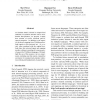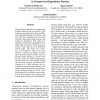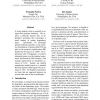144
click to vote
JMLR
2011
14 years 9 months ago
2011
A strong inductive bias is essential in unsupervised grammar induction. In this paper, we explore a particular sparsity bias in dependency grammars that encourages a small number ...
105
click to vote
CORR
2011
Springer
14 years 9 months ago
2011
Springer
To facilitate future research in unsupervised induction of syntactic structure and to standardize best-practices, we propose a tagset that consists of twelve universal part-ofspee...
133
Voted
NAACL
2010
15 years 19 hour ago
2010
We present three approaches for unsupervised grammar induction that are sensitive to data complexity and apply them to Klein and Manning's Dependency Model with Valence. The ...
127
click to vote
EMNLP
2010
15 years 4 days ago
2010
We introduce a novel training algorithm for unsupervised grammar induction, called Zoomed Learning. Given a training set T and a test set S, the goal of our algorithm is to identi...
109
click to vote
ACL
2010
15 years 5 days ago
2010
A strong inductive bias is essential in unsupervised grammar induction. We explore a particular sparsity bias in dependency grammars that encourages a small number of unique depen...
120
click to vote
CEC
2010
IEEE
15 years 3 months ago
2010
IEEE
Unsupervised grammar induction is one of the most difficult works of language processing. Its goal is to extract a grammar representing the language structure using texts without a...
109
click to vote
ACL
2006
15 years 3 months ago
2006
We investigate prototype-driven learning for primarily unsupervised grammar induction. Prior knowledge is specified declaratively, by providing a few canonical examples of each ta...



